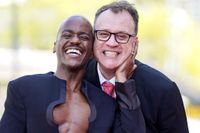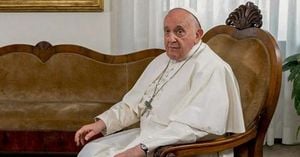The iconic BBC sci-fi series Doctor Who has returned with a groundbreaking twist, featuring its first-ever non-white lead duo. Ncuti Gatwa reprised his role as the Doctor, joined by newcomer Varada Sethu as companion Belinda Chandra. This casting decision has sparked both excitement and controversy, with some viewers accusing the show of being overly focused on diversity and "wokeness." However, showrunner Russell T Davies has firmly dismissed these criticisms, emphasizing that he sees diversity as an essential aspect of storytelling.
Speaking on BBC Radio 2, Davies addressed the backlash from online critics, stating, "Someone always brings up matters of diversity. And there are online warriors accusing us of diversity and wokeness and involving messages and issues. I have no time for this. I don’t have a second to bear [it]. Because what you might call diversity, I just call an open door." His comments reflect a broader commitment to inclusivity in the series, which has been a hallmark of Doctor Who since its inception in 1963.
Varada Sethu, who made her debut as Belinda Chandra last week, echoed Davies' sentiments, viewing the "wokeness" label as a positive affirmation of the show's direction. "Woke just means inclusive, progressive, and that you care about people," she remarked. "I just think we’re doing the right thing if we’re getting comments like that. And, as far as I know, the core of Doctor Who is kindness, love and doing the right thing."
Ncuti Gatwa, the first Black actor to take on the role of the Doctor, expressed similar views. He described the casting as a sign of progress in reflecting the diverse societies in which we live. "That’s something incredible that media can do, and that’s what it’s doing," he stated. Gatwa also expressed hope for a future where having non-white leads is no longer viewed as a significant achievement, saying, "It should just be normal."
The show's history is rich with change, having seen 19 different actors take on the lead role since its launch. The introduction of Jodie Whittaker as the first female Doctor in 2017 marked another significant shift in the series' approach to representation. Gatwa's casting as the 15th Doctor in 2023 further exemplifies this evolution.
Despite the positive strides, rumors have recently surfaced suggesting that Doctor Who may be facing cancellation, with unconfirmed reports indicating that Gatwa is set to leave the show. The BBC has stated that any decisions regarding the show's future will be made after the current series concludes.
In response to the ongoing debates about representation, Davies emphasized that he does not consciously write with a particular agenda in mind. He stated, "I don’t even know if it’s conscious. That’s life, and I think it’s the only way to write." He believes that confining narratives to a narrow perspective ultimately stifles creativity. "Why limit yourself? Why breathe in the exhaust fumes? Why be toxic? Come over here where the life and light and air and sound is," he added.
As the show continues to navigate these conversations, Sethu's experience on set has been enlightening. She recalled her first days with Gatwa, who told her, "Look at us. We get to be in the Tardis. We’re going to piss off so many people." This light-hearted comment underscores the playful spirit that the new cast brings to the series while also acknowledging the weight of their roles as representatives of a broader spectrum of society.
Ultimately, the current season of Doctor Who is not just about the characters or the stories; it's about how those stories reflect the world we live in today. Gatwa's and Sethu's casting signals a commitment to inclusivity that resonates with many viewers, while also challenging others who may be resistant to change.
As the series progresses, it will be interesting to see how it continues to balance the legacy of its past with the demands of a more diverse audience. The conversations surrounding diversity and representation are likely to continue, but for Gatwa, Sethu, and Davies, the focus remains on telling stories that resonate with the realities of modern life.
In a landscape where media representation is increasingly scrutinized, Doctor Who stands at the forefront, pushing boundaries and inviting viewers to engage with a broader narrative. The show's legacy of innovation and adaptation is evident, and its current direction promises to keep it relevant in an ever-evolving cultural landscape.






